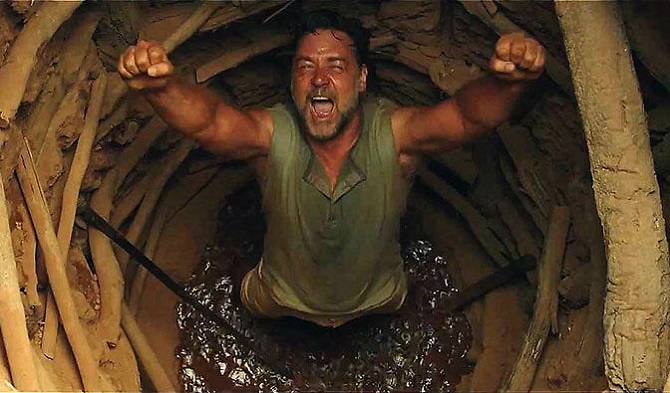

At one point during The Water Diviner, Russell Crowe's directorial debut, I thought to myself, "Okay, what exactly is this movie trying to get across?" Not a good sign for a film with pretty simple aspirations that somehow wound up cleaning up at the Australian equivalent of the Academy Awards.
The film starts off simply enough, introducing the character of Joshua Connor (Crowe), a man who has an uncanny ability to tell where water can be found in order to make wells. I know precious little about how wells are made in the first place, so I can't really make fun of the process the way it's presented in the film without sounding like a bit of an assuming smartass. Maybe this is how it's really done. That being said, all respect due to you pseudo-psychic well diggers out there, whoever you may be. For all I know, we're gonna need you guys in California really soon.
Anyway, we come to find out that Connor has three sons who all went to fight the good fight in Gallipoli during World War I but none of them ever made it back. Four years have passed and Connor's wife is a mental wreck, barely able to function normally due to the overwhelming grief consuming her. One of the film's few effective emotional moments comes early on when she demands that Connor read their children a story before bedtime and Connor agrees to read Arabian Nights to a trio of empty beds. Soon after, she commits suicide by drowning herself in a nearby body of water. This sets Connor forth on a journey to where his sons were reported to have died in battle in order to fulfill the promise he makes to his wife to bring their remains back to Australia and have them interred in consecrated ground.
That's the set up, but The Water Diviner is about as predictable as they come. Believe me, you'll see where this is going way before you get there. The real problem with the film is its repeated attempts to do too much in too little time. The film has things it seems to want to say about the general horrors of war, the hypocrisy of organized religion and organized marriages, but these subjects are just touched upon in passing. Certain character relationships never really get resolved or have much in the way to do with anything whatsoever.
Take when Connor meets up with Ayshe (Olga Kurylenko), the owner of a tiny little hotel in Istanbul where Connor winds up. He develops a relationship with her precocious young boy and slowly gains her trust, only to leave you wondering why they waste so much of the story with this overly familiar brand of nonsense. It feels like the film is pandering to those who aren't big on the brutalities of war, giving them something soft and safe to engage in.
There's a scene with the two of them having dinner in a room with enough lit candles to remind you of your favorite Lifetime movie. It's all there: the soft lighting, the awkward yet cute moments of love forming in the air, the look in Connor's eyes suggesting he wants to partake in a different kind of well digging. Kind of weird to have a scene like this taking place mere weeks after his wife's death, but, hey, love's a funny thing.
This, along with some other little asides, only serves to derail the more interesting story involving Connor's search for his brood. Speaking of which, there's this whole thing going on where Connor seems to be able to tell exactly where his son's bodies are located using his psychic water-location powers. Something tells me that this detail falls out of the "Inspired by True Events" bracket that the film presents us with during the credits. It's shown that he can do this but is then inexplicably ignored for the rest of the film.
The film is also peppered with flashbacks to the battle at Gallipoli, and this may be the first time that I've seen a movie battle scene where the visuals don't really do justice to the sound design, instead of the other way around. The smallest looking explosions sound like atomic bombs in the film, which comes off as jarring.
Jai Courtney also shows up in what is little more than a glorified cameo, only then to be upstaged by his mustache. Whether Freddie Mercury was the inspiration for it or not was something that was left out of the press package I received, but let's just pretend that it was and blast "Who Wants to Live Forever" collectively from our individual Spotify accounts.
The Water Diviner is not a terrible film, but it is a dry one that likely would have been more engaging in the hands of someone with more directing expertise and a tighter, more focused script. The story had the potential of being a truly touching and moving film but fails to meet that mark. Crowe could very well find his stride as a director after another film or two, but as of right now, The Water Diviner doesn't stand as a must-see directorial debut.











